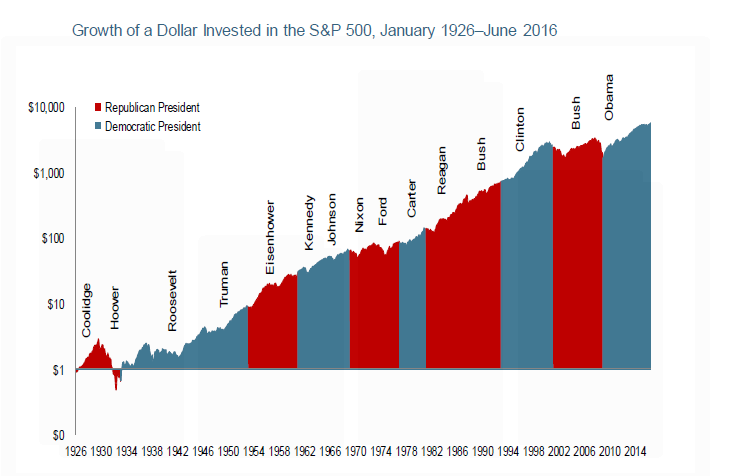Next month, Americans will head to the polls to elect the next president of the United States. While the outcome is unknown, one thing is for certain: There will be a steady stream of opinions from pundits and prognosticators about how the election will impact the stock market.
As we explain below, investors would be well-served to avoid the temptation to make significant changes to a long-term investment plan based upon these sorts of predictions.
Short-Term Trading and Presidential Election Results
Trying to outguess the market is often a losing game. Current market prices offer an up-to-the-minute snapshot of the aggregate expectations of market participants. This includes expectations about the outcome and impact of elections. While unanticipated future events—surprises relative to those expectations—may trigger price changes in the future, the nature of these surprises cannot be known by investors today. As a result, it is difficult, if not impossible, to systematically benefit from trying to identify mispriced securities.
This suggests it is unlikely that investors can gain an edge by attempting to predict what will happen to the stock market after a presidential election.
Bulls & Bears ≠ Donkeys & Elephants
Predictions about presidential elections and the stock market often focus on which party or candidate will be “better for the market” over the long run. The graph above shows the growth of one dollar invested in the S&P 500 Index over nine decades and 15 presidencies (from Coolidge to Obama). This data does not suggest an obvious pattern of long-term stock market performance based upon which party holds the Oval Office. If your eyes follow the top line of the chart, you see that the performance trends for the stock market have been remarkably similar for both parties. The key takeaway here is that over the long run, the market has provided substantial returns regardless of who controlled the executive branch.
Long-Term Investing
Equity markets can help investors grow their assets, but investing is a long-term endeavor. Trying to make investment decisions based upon the outcome of presidential elections is unlikely to result in reliable excess returns for investors. At best, any positive outcome based onsuch a strategy will likely be the result of random luck. At worst, it can lead to costly mistakes. Accordingly, there is a strong case for investors to rely on patience and portfolio structure, rather than trying to outguess the market in order to pursue investment returns.
Year-to-Date Results
It is refreshing to see that we are once again being rewarded for diversification and our global exposure to small cap and valuestocks. Persistently low interest rates have contributed to an environment in which Large Cap Growth stocks outperformed, especially in the US. As you review where the performance comes from in 2016, you will see that Emerging Markets, for example, have enjoyed a solid rise this year.


